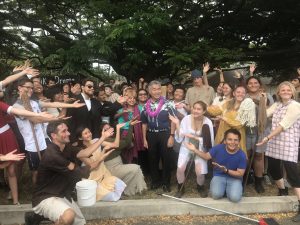She’s been on the job for a little over a year, but DOE Superintendent Christina Kishimoto has already faced some tough issues — from the recent debate over a constitutional amendment for more school funds to stricter anti-bullying policies and keeping students safe during the Kīlauea eruption and record floods.
What have been the most inspiring and challenging parts of the job so far? “The most inspiring part has been the amount of innovation already happening in our classrooms,” she replied enthusiastically. “We have all these best-kept secrets and hidden gems. Principals and teacher teams are asking, ‘Do we have permission to go in this direction?’ To which my answer is always the same: This isn’t about permission, it’s about what’s best for the students.” And the biggest challenge? “We’re a statewide school system that serves every child. We don’t turn anyone away. We want to create this engaging and dynamic learning environment where students can succeed. We encourage collaboration from all our partners, from parents to our communities and our elected officials to help guide this process for all our students.”
The constitutional amendment on the November ballot may have been struck down by the Hawai‘i Supreme Court, but the issues it raised are still front and center for Kishimoto. “We, the state, have some decisions to make about how we’re going to fund public education and better teacher pay,” she said. “Either we need to all be at the table together to create an advanced public education system or we can fall prey to creating these divisions and avoid the tough conversations.” Kishimoto said her top issue right now is to raise teacher salaries “so we can attract and retain the best educators for our students.” She’s concerned the supply of applicants is diminishing, especially for special education teachers to help close the student achievement gap, and others who worry they can’t afford the high cost of living in Hawai‘i.
Also high on the list is community discussion about stricter anti-bullying policies in the schools. Statewide public hearings on the DOE’s updated student discipline code will continue through December. The student discipline code moves bullying at the secondary school level to a more serious Class A offense to signal that it is a behavior that won’t be tolerated in the schools. However, Kishimoto stressed that while students need to know there are consequences for their behavior, “the focus is still on education and making sure our students learn from their mistakes.” The DOE is developing an anti-bullying app to provide both resources and a process for students to get help if they’re being bullied. The department asked State Student Council leaders for input to make the app useful and plans to make it available to middle schools in January 2019 and to high schools in the summer. Following that, the DOE will make adjustments for an elementary school version.
Kishimoto said the past year has been devoted to launching a design process at every school for more community-based empowerment. “For years the emphasis has been on a top-down set of standards with centralized curriculum design,” explained Kishimoto. “Now we’re asking schools to collaborate at the complex level, taking into account the resources in the community for real engagement. We’re still incorporating the same standards of critical thinking, problem-solving, math, literacy and other skills but delivered in a way that takes advantage of that community’s uniqueness — whether it’s a school in a rural area with rich ‘āina-based resources or an urban center surrounded by businesses, for example.”
Kishimoto said she was hired with a clear understanding of what was expected of her. “The Board of Education, legislators, community members and parents all asked for a real focus on innovation and school-based empowerment.” She said delivering on that challenge is at the heart of budget and programmatic decisions. These have ranged from providing school-level innovation grants and more computer science education development in grades K-12 statewide as well as increased funds through the student-weighted formula, which pushes money directly to the schools. “Currently, 93 percent of the state’s DOE budget is either in the hands of principals or in shared services such as busing and food services,” she explained. “We moved three-quarters of our Title II teacher development funds to the schools and complex area superintendents. And we’re looking at how to reprogram internal funds before we ask for more money from the Legislature.”
To improve budget transparency, Kishimoto said the DOE is already taking steps in that area with “budget briefs” posted online to simplify complex reports. Kishimoto said she understands the need for accountability and welcomes ways to assure taxpayers that public funds are being well-spent. Board of Education chair Catherine Payne concurred about the need to work together. “We’re at the moment when our schools can be not just good but great. We need communities and businesses to help us.”
Read more in the December Capitol Connection newsletter.
Subscribe to the Capitol Connection newsletter.


